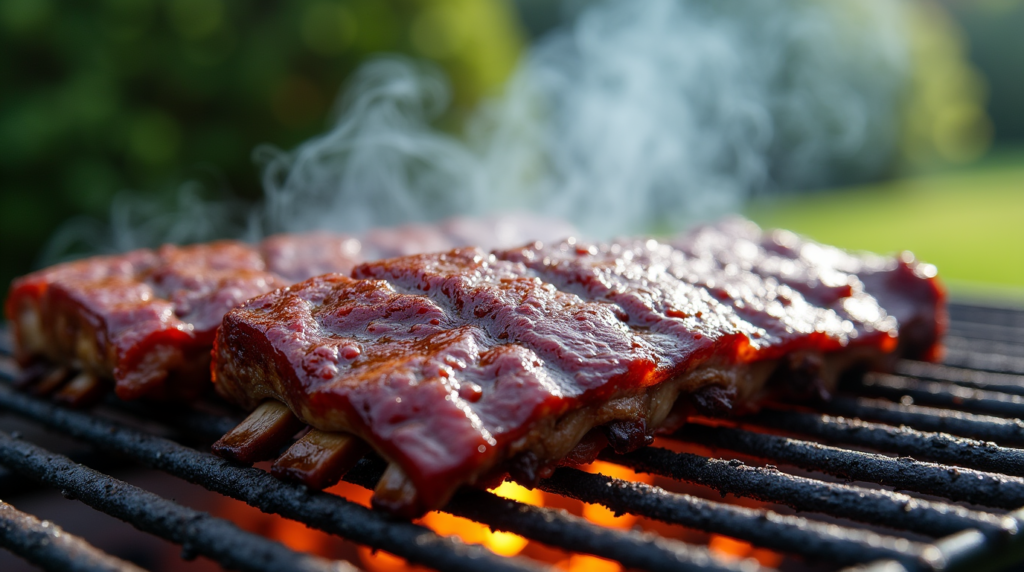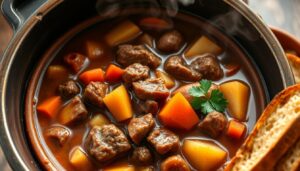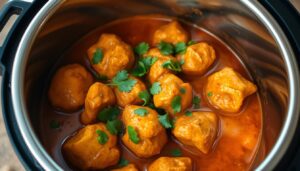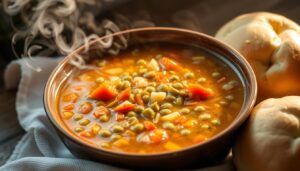As the sun sets and the grill sizzles, nothing beats the smell of grilled beef ribs. Whether you’re an expert or just starting, the secret to tender and flavorful ribs is easy. Let’s explore how to grill amazing beef ribs that everyone will love.
Table of Contents
Tender and Juicy Beef Ribs Made Easy
To get tender and juicy beef ribs, you need a special method. Low and slow cooking is the key. It breaks down tough tissue and makes the fat flavorful, creating a delicious rib experience.
Explore the Art of Low and Slow Cooking
Beef ribs need a slower cooking method than pork ribs. Cooking them at 225°F to 250°F lets the meat tenderize and flavor deepen. This slow cooking takes hours but results in tender beef ribs that are juicy and full of flavor.
Unlock the Secrets to Mouthwatering Ribs
To get the best beef ribs, mastering low and slow cooking is essential. Here are some tips:
- Remove the membrane from the back of the ribs for better seasoning and tenderness.
- Use a flavorful dry rub to penetrate the meat for maximum flavor.
- Cook the ribs on indirect heat, whether in the oven or on the grill, for even cooking.
- Baste the ribs with homemade barbecue sauce or glaze in the last hour for a sticky finish.
- Let the ribs rest for 45-60 minutes before slicing to keep the juices in.
“The beef back ribs were delicious!” – Diana Rattray, recipe tester
By using these techniques, you’ll make mouthwatering beef ribs that everyone will love.
Choosing the Perfect Cut of Beef Ribs
Choosing the right cut of beef ribs is key to a great grilling experience. Beef ribs come in two main types: short ribs and back ribs. Each has its own special qualities and uses in cooking.
Beef Short Ribs vs. Back Ribs: What’s the Difference?
Beef short ribs come from the lower rib cage, known as the chuck or plate. They are thicker and have more fat, making them taste richer and more flavorful. In contrast, beef back ribs are what’s left after a prime rib roast is cut. They are pricier and have less meat between the bones.
| Beef Short Ribs | Beef Back Ribs |
|---|---|
| Thicker cut with more marbling and fat | Leaner cut with less meat between bones |
| Richer, more flavorful taste | Delicate, slightly drier texture |
| Less expensive | More expensive |
When picking the perfect beef ribs for grilling, think about what you like and what you want to achieve. Beef short ribs are great for a meaty, indulgent experience. Back ribs are better for those who prefer a leaner, more delicate option.
No matter your choice, the secret to great ribs is to cook them low and slow. This breaks down the connective tissue and blends the flavors. With the right method and patience, you’ll get tender, juicy, and delicious beef ribs that will wow your guests.
Essential Tools for Grilling Ribs
Grilling beef ribs needs the right tools and equipment. Quality grilling accessories make the process easier and improve results. Here are the essential tools to enhance your rib-grilling skills.
Reliable Grill
A good grill is key for grilling ribs. Choose from gas, charcoal, or smoker grills. Make sure it can cook at low and slow temperatures, between 250°F to 275°F. This is crucial for tender, juicy ribs.
Heavy-Duty Foil
Heavy-duty aluminum foil is a must for grilling ribs. It wraps the ribs during cooking. This helps keep the meat moist and tender.
Meat Thermometer
A meat thermometer is vital for grilling. It ensures the ribs reach 145°F or higher. This is for the best taste and safety.
Rib Racks or Holders
Rib racks or holders are great for cooking multiple racks at once. They save space and ensure even cooking.
With these tools, you’re ready to master low and slow rib cooking. You’ll get tender, flavorful ribs that everyone will love.
| Essential Grilling Tool | Purpose |
|---|---|
| Reliable Grill | Maintain consistent low and slow cooking temperatures for tender, juicy ribs. |
| Heavy-Duty Foil | Wrap the ribs during cooking to retain moisture and tenderize the meat. |
| Meat Thermometer | Ensure the ribs reach the perfect internal temperature of 145°F or higher for optimal doneness and food safety. |
| Rib Racks or Holders | Cook multiple racks of ribs simultaneously, maximizing grill space and ensuring even cooking. |
The Ultimate Dry Rub for Beef Ribs
Take your beef ribs to the next level with a tasty dry rub. This seasoning mix is easy to make and adds amazing flavor. It turns grilled or smoked ribs into a dish you’ll love.
Savory Spices to Elevate Your Rib Flavor
The secret to our dry rub is the special spice blend. It has brown sugar, black pepper, smoked paprika, garlic powder, onion powder, and mustard powder. These spices mix sweet, savory, and smoky tastes perfectly. Adding a bit of cayenne pepper gives it a spicy kick.
You can keep the dry rub in an airtight container for up to 6 months. It’s great for saving money and time. This recipe makes 13 tablespoons, enough for many grilling sessions.
| Ingredient | Quantity |
|---|---|
| Brown sugar | 4 tablespoons |
| Black pepper | 2 tablespoons |
| Smoked paprika | 2 tablespoons |
| Garlic powder | 1 tablespoon |
| Onion powder | 1 tablespoon |
| Mustard powder | 1 tablespoon |
| Cayenne pepper (optional) | 1 teaspoon |
To use the dry rub, just put about 1 tablespoon on each pound of ribs. Rub it well into the meat. The brown sugar’s sweetness, smoked paprika’s flavor, and cayenne’s heat make a delicious dry rub for ribs.
For the best taste, use this spices for beef ribs mix within 3-4 months. Enjoy your juicy, flavorful beef ribs with this ultimate dry rub!

Preparing the Grill for Low and Slow Cooking
To get perfect low and slow cooking for your beef ribs, you need to prepare your grill well. This ensures your ribs cook evenly and get that smoky, caramelized crust. Here are the key steps to follow:
- Set up a two-zone heat environment: Make your grill have a high-heat zone for direct cooking and a lower-heat zone for indirect cooking. This lets you sear and char the ribs on one side while cooking them gently on the other.
- Maintain the ideal rib grilling temperature: For low and slow grilling, keep the temperature between 225°F and 275°F. This grill setup for ribs helps the meat cook slowly and tenderly without drying out.
- Monitor the temperature: Always have a reliable grill thermometer nearby to check the temperature often. Adjust the vents or burners as needed to keep the rib grilling temperature just right.
By following these steps, you’ll set up your grill perfectly for low and slow grilling your beef ribs. This will give you tender, juicy, and flavorful ribs every time.
“The secret to mouthwatering ribs is all in the setup. Nail the grill temperature, and the rest will fall into place.”
| Rib Type | Recommended Cooking Time | Ideal Grill Temperature |
|---|---|---|
| Beef Back Ribs | 2 hours indirect heat + 30-60 minutes direct heat | 225°F – 275°F |
Beef Ribs Recipe Grill: Step-by-Step Instructions
Get ready to master the art of grilling mouthwatering beef ribs. This easy guide is for both seasoned grillers and newcomers. You’ll get restaurant-quality results in your backyard.
First, prepare the ribs. Remove the thin membrane on the underside. This lets seasonings get into the meat, boosting flavor. Then, cover the ribs with your favorite dry rub, making sure to get every part.
- Preheat your grill to 220°F. This slow cooking is key for tender and juicy ribs.
- Place the seasoned ribs on the grill and let them smoke for about 7 hours. Spritz with apple cider vinegar every 45 minutes to keep them moist.
- Check the ribs’ internal temperature with a meat thermometer. Aim for 200°F to know they’re perfectly cooked.
- After reaching 200°F, brush with your favorite barbecue sauce. Smoke for 20 more minutes to get a tasty glaze.
Follow these steps to grill the most tender, juicy, and flavorful beef ribs. Your guests will love them. Enjoy your delicious, grilled beef ribs!
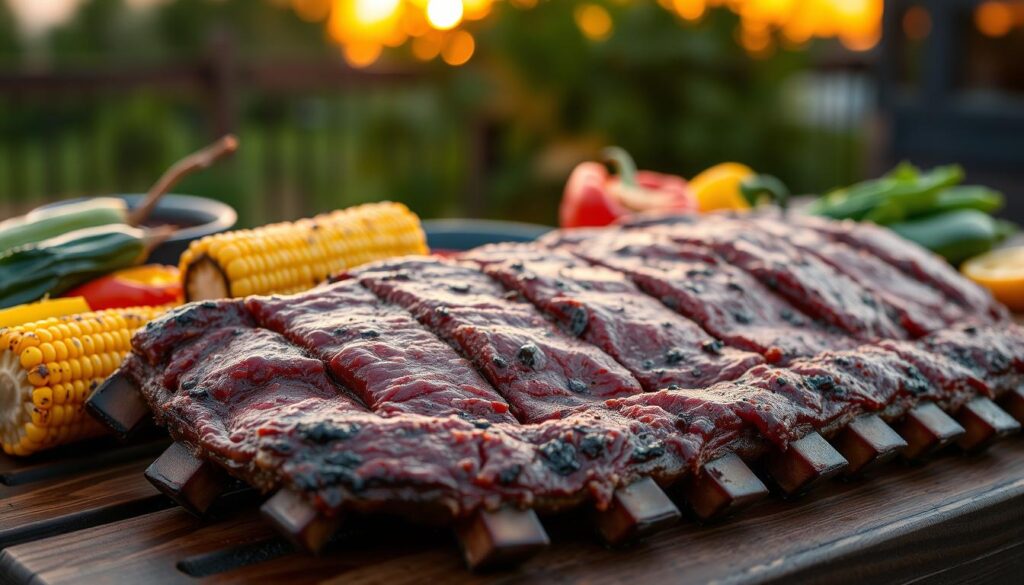
Basting and Saucing Your Beef Ribs
Basting and saucing your beef ribs can make them taste amazing. It adds a sweet, caramelized crust. The trick is to apply the sauce at the right time. Use a homemade barbecue sauce that complements the beef’s richness.
Homemade Barbecue Sauce Recipe
To make a tasty homemade barbecue sauce for your basted beef ribs, you’ll need:
- 1 can (12 oz) of cola or root beer
- 1 cup of ketchup
- 1/4 cup of apple cider vinegar
- 2 tablespoons of brown sugar
- 1 tablespoon of Worcestershire sauce
- 1 teaspoon of smoked paprika
- 1/2 teaspoon of garlic powder
- 1/4 teaspoon of cayenne pepper (optional, for a bit of heat)
In a saucepan, mix all the ingredients and whisk them together. Heat it over medium until it simmers. Then, lower the heat and simmer for 15-20 minutes. Stir occasionally until it thickens. This homemade barbecue sauce is great for saucing your beef ribs and adds a tangy-sweet flavor.
| Ingredient | Amount |
|---|---|
| Cola or Root Beer | 1 can (12 oz) |
| Ketchup | 1 cup |
| Apple Cider Vinegar | 1/4 cup |
| Brown Sugar | 2 tablespoons |
| Worcestershire Sauce | 1 tablespoon |
| Smoked Paprika | 1 teaspoon |
| Garlic Powder | 1/2 teaspoon |
| Cayenne Pepper (optional) | 1/4 teaspoon |
Remember to baste your beef ribs with the sauce in the last 30-45 minutes of cooking. This will create a delicious, caramelized crust. Enjoy the perfect mix of sweet, tangy, and savory flavors in your homemade barbecue sauce for beef ribs.
Knowing When Your Ribs Are Done
Getting your beef ribs just right is key for a tender, juicy, and tasty dish. You’ll need to use a meat thermometer and look for visual and touch signs to check if they’re done.
The ideal internal temperature for beef ribs is 200-205°F (93-96°C). This ensures the meat is fully cooked and the connective tissues and fats are melted. To check, insert a meat thermometer into the thickest part of the rib, avoiding the bone.
You can also check by gently pressing on the meat. Cooked ribs should feel soft and the meat should easily come off the bone. If they’re still hard or the meat doesn’t budge, they need more grill time.
After reaching the right temperature and texture, let the ribs rest for 10-15 minutes before serving. This step helps the juices spread evenly, making the meat moist and flavorful.
Remember, the when are beef ribs done and rib doneness can change based on several factors. These include the ribs’ thickness, the grill’s temperature, and your taste preference. By combining temperature checks, visual signs, and the touch test, you can test rib tenderness and get perfectly cooked beef ribs every time.
Serving and Pairing Suggestions
Grilling beef ribs is a treat. The right sides and drinks can make it even better. They add to the rich flavors of the ribs, making everyone happy.
Sides and Beverages to Complement Your Ribs
For a great rib meal, try different side dishes. Coleslaw, baked beans, and corn on the cob are classics. They contrast nicely with the ribs.
For something new, make a creamy potato salad with Dijon and apple cider vinegar. Or, try a corn and zucchini salad with citrus vinaigrette.
Drinks can also enhance the meal. A cold beer or tangy soda pairs well with the ribs. For something else, lemonade or iced tea is refreshing.
| Side Dish | Preparation Time | Key Ingredients |
|---|---|---|
| Southern-Style Potato Salad | 45 minutes | Mayonnaise, yellow mustard, celery, sweet pickle relish, hard-boiled eggs |
| Cornbread Muffins | 30 minutes | Cornmeal, buttermilk, eggs, butter |
| Grilled Corn | 20 minutes | Corn on the cob, butter, spices |
Pairing your grilled beef ribs with tasty sides and drinks makes a memorable meal. Your guests will love it.
Tips for Reheating and Storing Leftover Ribs
Enjoying your delicious beef ribs doesn’t have to end when the meal is over. With the right techniques, you can easily reheat and store any leftover ribs. This way, you can enjoy the flavors again.
Storing Leftover Beef Ribs
To keep your leftover beef ribs fresh, follow these steps:
- Vacuum seal the ribs in a plastic bag to lock in moisture and prevent freezer burn.
- Alternatively, store the ribs in a foil pan, tightly covered with foil, or in a freezer-safe zip-top bag.
- For optimal freshness, plan to eat the stored leftover beef ribs within 1-2 days if kept in the refrigerator. For longer storage, freeze the ribs.
Reheating Beef Ribs
When reheating your leftover beef ribs, the goal is to keep them tender and juicy. Here’s how:
- Thaw the ribs in the refrigerator for about 24 hours before reheating, or use the cold water method, replenishing the water every 30 minutes until thawed.
- For reheating beef ribs that were vacuum sealed, you can choose from several options:
- Boil the sealed bag in water for 20-30 minutes.
- Reheat in the oven, grill, or smoker at 275°F (135°C) for 30-60 minutes.
- If the ribs were stored in a foil pan or zip-top bag, reheat them in the oven, grill, or smoker at 275°F (135°C) for 30-60 minutes.
- Avoid reheating ribs stored in zip-top bags by boiling, as this can lead to tough, dry results.
- For the best texture, aim to reheat the ribs to an internal temperature of 165°F (74°C).
By following these tips, your leftover beef ribs will be just as delicious as the day you grilled them.
Conclusion
Now you know how to make grilled beef ribs like a pro. This guide has given you all the tips and recipes you need. You’ll make beef ribs recipe that everyone will love.
You’ve learned how to pick the best ribs, season them right, and grill them perfectly. You can use either the slow method or the quick grill method. Now, you can make amazing ribs in your backyard.
So, fire up your grill and invite your friends and family over. You’re about to become the go-to grill master with this beef ribs recipe. Get ready for all the praise and enjoy those tender, juicy ribs.
FAQ
What are the benefits of low and slow cooking for beef ribs?
What is the difference between beef short ribs and beef back ribs?
What are the essential tools needed for grilling beef ribs?
What ingredients are in the ultimate dry rub for beef ribs?
How do you set up the grill for low and slow cooking of beef ribs?
What are the key steps in the beef ribs recipe for grilling?
How do you baste and sauce the beef ribs during the cooking process?
How do you know when your beef ribs are done?
What are some recommended side dishes and beverages to serve with grilled beef ribs?
How can you properly reheat and store leftover beef ribs?
Source Links
- Hawaiian Style BBQ Ribs – https://ourbestbites.com/hawaiian-style-bbq-ribs-with-grilled-pineapple/
- Grilled Korean Short Ribs – https://www.yellowblissroad.com/korean-short-ribs/
- Mississippi Beef Short Ribs – https://www.allrecipes.com/recipe/270954/mississippi-beef-short-ribs/
- Make These Unforgettable Slow-Grilled Beef Ribs, You’ll Thank Us Later! – https://www.thespruceeats.com/slow-grilled-beef-ribs-335856
- Grilled Beef Ribs – https://www.tasteofhome.com/recipes/grilled-beef-ribs/
- Oven Baked Beef Ribs (Tender & Juicy) – https://www.myforkinglife.com/oven-baked-beef-ribs/
- Three Little Pigs BBQ & Catering – https://three-little-pigs-bbq.com/dev/help-i-need-to-know-what-cut-of-beef-ribs-to-tell-my-butcher/
- Perfect Beef Ribs for Wood Smoked BBQ: Top Tips – https://centralcitybbq.com/perfect-beef-ribs-for-wood-smoked-bbq-top-tips/
- Grilling Ribs for Beginners: A Step-By-Step Guide – https://www.thebbqdepot.com/blog/grilling-ribs-for-beginners/?srsltid=AfmBOopnRZQ4fbiiQouT7WxMgcufF6FKFoKjupsXB3ENHXxFSVO4io4V
- How To BBQ Ribs On A Gas Grill – https://www.grillseeker.com/how-to-bbq-ribs-on-a-gas-grill/
- Dry Rub for Ribs – https://whitneybond.com/dry-rub-for-ribs/
- The Best Dry Rub Recipe – Foxes Love Lemons – https://foxeslovelemons.com/dry-rub-for-ribs/
- Grilled Beef Ribs – https://cookthestory.com/grilled-beef-ribs/
- Barbecue Ribs recipe on the grill – https://www.sugarmaplefarmhouse.com/barbecue-ribs-recipe-on-the-grill/
- Traeger Beef Ribs – https://www.jerkyholic.com/traeger-beef-ribs/
- Fire Up the Grill for the Best-Ever Baby Back Ribs – https://www.thepioneerwoman.com/food-cooking/recipes/a36211603/grilled-bbq-ribs-recipe/
- Beef Back Ribs Recipe – Healthy Recipes Blog – https://healthyrecipesblogs.com/oven-beef-back-ribs/
- Competition Butter and Cola Basted Beef Shortribs – https://www.slapyodaddybbq.com/2024/06/competition-butter-and-cola-basted-beef-shortribs/
- Rib Basting Sauce – https://www.pinterest.com/ideas/rib-basting-sauce/896052011562/
- BBQ Ribs (Beef or Pork!) – https://www.theroastedroot.net/bbq-beef-ribs/
- How to Cook Ribs on the Grill—Including Baby Back Ribs, Spare Ribs, and More – https://www.realsimple.com/food-recipes/cooking-tips-techniques/grilling/how-to-cook-ribs-on-the-grill
- 16 Tips You Need When Cooking Beef Ribs, According To Experts – Tasting Table – https://www.tastingtable.com/1565917/tips-cooking-beef-ribs/
- 15+ Great Side Dishes That Pair Perfectly With Ribs – https://www.realsimple.com/food-recipes/recipe-collections-favorites/ribs-side-dish-recipes
- Our Favorite Side Dishes To Serve With Barbecue Ribs – https://www.southernliving.com/food/side-dishes/what-to-serve-with-ribs
- 50 Side Dishes For Those Who Know BBQ Is About More Than The Ribs – https://www.delish.com/cooking/recipe-ideas/g43342359/side-dishes-for-ribs/
- How to Store and Reheat Smoked Pork Ribs – Learn to Smoke Meat with Jeff Phillips – https://www.smoking-meat.com/how-to-store-and-reheat-smoked-pork-ribs
- The Best Way To Reheat Ribs – https://www.southernliving.com/food/meat/ribs/how-to-reheat-ribs
- Slow Grilled Ribs with Chris’* Great Rub – Green Mountain Girls Farm – https://eatstayfarm.com/2024/10/slow-grilled-ribs-with-chris-great-rub/
- How to Cook Beef Chuck Short Ribs | Steak University – https://www.mychicagosteak.com/steak-university/cook-beef-chuck-short-ribs
